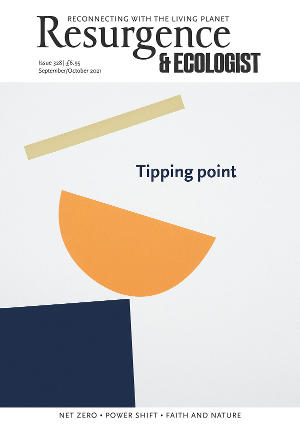Jay Griffiths’ latest book is a passionate defence of a planet that is vibrant, storied and interconnected. By extension, it is also a stand against rhetoric, dead language and fascism. Griffiths weaves her subjects together into an intricate tapestry. Insects, metaphor and fascism may not feel connected to you now, but by the time you finish this book you will wonder how you ever saw them as siloed subjects.
One of the features that make this small but powerful book unique is the connection Griffiths draws between metaphor and the political world. Metaphor is often considered a technical tool of the writer, but for Griffiths it is the animating force of life. Griffiths writes about metaphor, not with the eyes of a technician, but with the eyes of a lover. She manages to go to the quick of how language functions, not on the page, but in our hearts. For example, she writes that the language around oceans is “a heap of broken plastic words”. In using bureaucratic words to describe a living, breathing being on which so much of life depends, she argues that we make invisible behaviour that would, given the appropriate language, seem barbaric.
Why Rebel is also a lyrical ode to insects. Griffiths entices the reader to see the insect as a humble, holy creature doing physical work, yes, but physical work that is the foundation for everything we hold dear. “And from physical life flows everything to be treasured in human life, from existence itself to the highest art form,” she writes. Her telling of the story of insects re-imagines them as angels who keep alive the living and quietly remove the dead. To be taken through the world of insects by Griffiths is to be enchanted by the natural world. With her, we marvel at bioluminescence, we take notice of the flight pattern of a damselfly and are in awe. On the other side of the ledger, Griffiths is deeply saddened by the loss of insects. She imagines a world without wings, in which birds can no longer feed on insects and the sky is eerily still.
Most presciently, Why Rebel is a book about extinction itself. Griffiths uses the word ‘endling’ to describe beings that have left us. She writes about endings with a warmth and tenderness that we should all feel in our hearts daily. She explores what it means for an entire world to be snuffed out. When a species dies that’s exactly what happens. How can such an event not touch us deeply? For Griffiths it’s personal. It’s not about any one species as a whole, but that single water boatman, that bee alighting on a primrose, that swallow shooting into its nest. She asks the reader to open up their spirit to the interconnectedness of life.
This is a book about metaphor, about insects, about extinction. It is compact, but it is expansive and moving. Griffiths captures the gravity of the climate emergency whilst also capturing the reasons we are moved to defend our planet. If you find yourself at the crossroads of wonder and despair as you look out at our dying, yet still-vibrant natural world, Griffiths is your ideal tour guide. She will enchant you, wake you up, and move you to be a champion for everything we hold dear. Griffiths makes the weaving together of disparate topics seem effortless, and it is a joy and a privilege to be initiated by her into the interconnected world that we all inhabit together.






